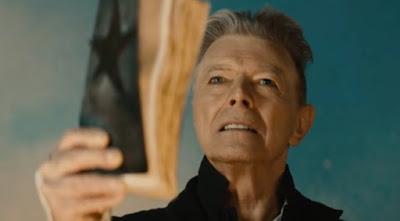by Paul J. Pelkonen

David Bowie in the video for the title track of Blackstar.
David Bowie, whose contributions to music, art, fashion and popular culture mark him as one of the most important artists of the 20th and 21st centuries, died yesterday after an 18-month battle with cancer. The artist had just celebrated his 69th birthday with the release of ★ (Blackstar), his 25th album.
Bowie emerged as a singer-songwriter in London in the 1960s, with songs like "Space Oddity" making an early impact. From there, he began a dizzying series of personal and artistic transformations. Onstage, he created memorable personae: the red-headed decadent rock star Ziggy Stardust, the schizoid Alladin Sane and the ascetic, authoritarian persona dubbed the Thin White Duke before emerging in his later years as an impeccable elder statesman. He eschewed knighthood, but accepted induction into the Rock and Roll Hall of Fame in 1996.
The albums that accompanied these changes (Hunky Dory, The Rise and Fall of Ziggy Stardust, an important rock opera and Diamond Dogs) are all timeless classics that continue to be relevant today. And the songs are amazing: "Life on Mars?", "Starman", "The Jean Genie," "Rebel Rebel", "Ziggy Stardust", "Suffragette City" and "Five Years" are just a few highlights.
In 1975, he veered into pop with albums like Young Americans (made in the style of Philadelphia soul) and explored acting, appearing in The Man Who Fell to Earth. His acting career would continue, including memorable turns as the Elephant Man on Broadway, the Goblin King in the Jim Henson fantasy Labyrinth and as Nikola Tesla in the magician vs. magician thriller The Prestige. In 2015, he opened an off-Broadway show "Lazarus" further exploring ideas from The Man Who Fell to Earth.
As Ziggy and later Alladin Bowie struck a bold note for androgyny in the presentation of music, using his art to destroy preconceptions about gender and sexuality with songs that were memorable and often mysterious. His stage shows sold too, with huge productions like the Ziggy tour and Diamond Dogs, an elaborate show produced by Toni Basil. He wrote songs that became classics for other artists, including "All the Young Dudes" for the British band Mott the Hoople. He collaborated with Bing Crosby on the Christmas single "The Little Drummer Boy," and Queen on the smash hit "Under Pressure."
In 1977, Bowie released Low, his first collaboration with producer Brian Eno. It was not a commercial success but it has been recognized as a work of genius, despite the misgivings of critics and his record company at the time. It was followed by "Heroes" with its churning Robert Fripp guitar riff and Cold War imagery and the picture of West Berlin as an isolated city under siege. Those two albums were also a huge influence on composer Philip Glass, who would name his first and fourth symphonies after Low and "Heroes". Lodger completed the trilogy with a return to guitars and drums, and also saw the end of his long bout with drug addiction.
Revitalized, he started the '80s with a roar, scoring Number One hits with "Ashes to Ashes" (a sequel to "Space Oddity" and "Under Pressure." Then came Let's Dance and its attendant MTV hits "Modern Love" and "China Girl" before closing out the decade as leader of the decidedly uncommercial rock band Tin Machine. After the group's two albums were met with indifference, he went back to solo work.
A restless and constantly searching artist, he compounded his success by releasing album after album in a blizzard of sound that ignored radio success and occasionally bewildered his fanbase. He explored electronic music, industrial and ambient before shifting back to old-fashioned rock and roll. A ten-year silence ended in 2013 with The Next Day, which was dropped on the public with no hype or build-up. The style shifts continued until the end: Blackstar found him hurtling into jazz.

